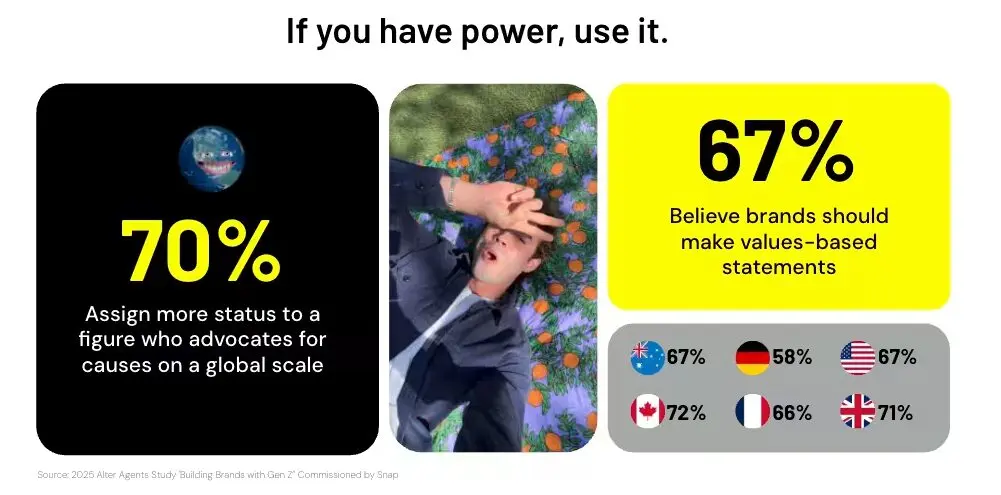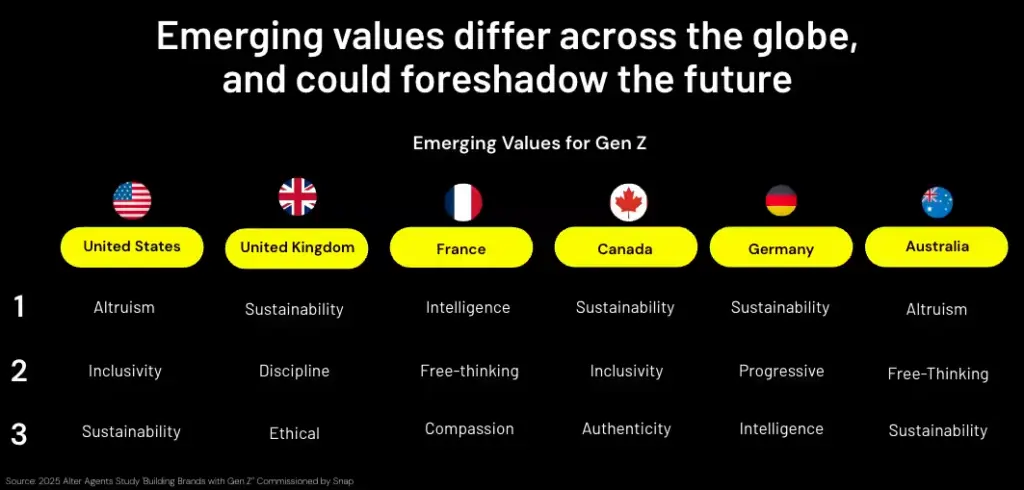- Action Over Accumulation: 70% of Gen Z rank global advocacy above wealth, so brands must showcase real, measurable social impact to earn credibility.
- Values-Driven Purchases: 60% of young consumers only buy from brands whose principles align with their own, with sustainability, inclusivity, and kindness rising in importance.
- Regional Nuance Matters: While sustainability tops global concerns, U.K. Gen Z prizes discipline, France favors compassion, and Canada/Australia emphasize environmental stewardship.
- Ambition, Not Apathy: Contrary to stereotypes, 69% of Gen Z respect those who work hard and diversify income; brands should spotlight entrepreneurial stories and offer tangible support.
- Heritage Brands Can Thrive: Nearly half of Gen Zers are open to legacy labels—if they innovate through creator partnerships, authentic co-creation, and nostalgia reimagined for today.
Learn why a one-size-fits-all approach fails and how regional nuances shape brand strategies.
When brands lump Gen Z into a single stereotype, they lose touch with a cohort whose values and behaviors vary widely across regions. Snapchat’s new report, based on a survey of 6,000 users aged 13–27 across the U.S., U.K., Canada, France, Germany, and Australia, reveals five “gems” about how young consumers think about status, values, work ethic, and heritage brands.
Here’s what every marketer needs to know:
Status Redefined: Action Trumps Affluence
Traditionally, status has been earned by wealth, possessions, or high-profile associations. Gen Z flips that script. According to Snapchat’s survey, 70% of young people say they’d grant higher status to someone who champions global causes, while 59% downgrade those who flaunt their wealth on social feeds.

Source: Snapchat
This represents a fundamental shift: Gen Z wants to see tangible evidence of positive impact, not just glossy pledges.
In practice, that means cause-based marketing campaigns that simply slap a logo on a charity event or a cursory social post won’t resonate. This generation expects brands to integrate purpose into every layer of their operations—from sustainable supply chains to employee volunteer programs—and then to broadcast those efforts in authentic, data-driven ways. When a brand can show measurable results—clean water delivered, trees planted, or communities uplifted—Gen Z responds with loyalty.
Moreover, this commitment to action extends beyond environmental or humanitarian efforts; it includes any initiative that addresses systemic challenges, whether in education, mental health, or digital equity. Brands that invest in long‐term partnerships and transparently report progress will stand out in a landscape crowded with superficial campaigns.
Brand Tip: Flex Impact
Gen Z won’t stand for bare‐minimum cause marketing. Commit to ongoing, measurable social initiatives and communicate progress regularly to earn respect and engagement.
Integrity Is Non-Negotiable: Values Drive Purchases
For Gen Z, brand identity isn’t built on product specs alone; it’s grounded in shared values. Snapchat’s data shows that 60% of respondents only purchase from brands whose principles align with their own, and a majority are willing to pay a premium for those brands.
The core values driving these decisions include respect (73%), trust (70%), and honesty (69%). Over the past year, sustainability (44%), inclusivity (38%), and kindness (25%) have surged in importance, reflecting evolving social priorities.
@loosendsyarn Transparency & sustainability are my TOP priorities, so let’s talk more about tshirt yarn, and where I source mine from! #tshirtyarn #textilewaste #upcycling #reclaimedfabric #yarnlovers #yarnbusiness #manufacturertips #transparencymatters #buildingabusiness #crochet
When brands articulate their commitments—whether through transparent sourcing, inclusive hiring practices, or support for marginalized communities—they lay the foundation for trust. But talking isn’t enough.
Gen Z expects brands to bake those principles into every touchpoint: packaging choices, customer support policies, and even promotional mechanics. A brand that touts sustainability but ships single-use plastics or that champions inclusivity yet lacks diverse leadership will be quickly called out—and can expect backlash.
Another dimension of integrity is consistency. Gen Z watches not just campaigns but also daily operations. When a brand’s marketing message aligns with its customer service tone, product performance, and employee experience, it creates a cohesive narrative that young consumers value.
Conversely, any disconnect can erode trust in an instant—especially on social media, where word spreads quickly.
Brand Tip: Align Values to Drive Impact
Translate your core principles into visible actions across your entire business. Share stories of those actions and invite Gen Z to hold you accountable.
Not All Gen Z Think Alike: Market-Specific Priorities
Despite being grouped under a single generation label, Gen Z’s values vary significantly by region. Snapchat’s findings reveal that British users increasingly prize discipline—viewing self-control and personal growth as markers of success—while French respondents place a premium on compassion and community care.
In Canada and Australia, environmental stewardship rises above other issues, whereas U.S. and German audiences emphasize inclusivity and digital privacy, respectively.

Source: Snapchat
These regional variations reflect distinct cultural contexts—from educational pressures and labor markets to national conversations on social welfare. Brands that overlook these differences risk alienating segments of their target audience by deploying generic global campaigns. Instead, successful marketers will combine a universal brand ethos with local narratives that speak to each market’s unique concerns and aspirations.
Implementing this approach requires robust local research—beyond surface-level demographic data. Ethnographic studies, regional focus groups, and partnerships with local creators can uncover the most resonant storylines. Content calendars then integrate these insights, ensuring that each campaign feels tailored rather than transplanted.
Brand Tip: Embrace Nuance
Develop regional playbooks that adapt your global message to local value hierarchies and cultural contexts, demonstrating respect for Gen Z’s diversity.
Bust the “Lazy” Myth: Ambition Commands Respect
The stereotype of Gen Z as entitled or lazy crumbles when confronted with Snapchat’s research: 69% of surveyed young people say they respect figures who work hard and secure multiple income streams, and 38% report that they’ve cultivated greater discipline this year. This focus on hustle culture reflects both economic realities—rising living costs and precarious employment landscapes—and a broader cultural celebration of entrepreneurship.
For brands, this translates into opportunities to spotlight real-life stories of young innovators, side-hustle success, and creative problem-solving. Campaigns that foreground these narratives—whether through documentary-style videos, interactive workshops, or collaborative product lines—can inspire Gen Z to see brands as partners in their own journeys, rather than mere vendors.
Moreover, brands can foster ambition by providing platforms for Gen Z to showcase their skills. Competitions, mentorship programs, or co-creation projects not only deepen engagement but also build authentic connections that outlast one-off marketing pushes.
Brand Tip: Spotlight Ambition
Feature Gen Z entrepreneurs, creators, and self-starters in your content. Celebrate their achievements and offer tangible support—such as mentoring or investment—to reinforce that you value hustle.
Legacy Brands Live On - If They Innovate
Despite the assumption that heritage labels are passé, Snapchat’s report demonstrates that nearly half of Gen Zers remain open to legacy brands—provided those brands engage authentically with contemporary culture. While only 37% currently associate established names with digital relevance, 65% indicate a preference for creator-driven content, revealing a pathway for heritage brands to regain cultural currency.
The key lies in agility and collaboration. Brands with deep histories can exploit their archives—iconic logos, classic product lines, original campaign motifs—to craft nostalgia-infused content. But they must reimagine those assets through Gen Z’s lens, collaborating with influencers, remixing vintage aesthetics, or launching limited-edition releases in partnership with contemporary artists.
This blend of past and present signals both respect for heritage and willingness to evolve.
Equally important is two-way communication. Gen Z expects brands to listen, engage in dialogue, and respond promptly. Live Q&A sessions, feedback-driven product iterations, and community-curated design challenges all reinforce that legacy brands are not relics, but responsive players in today’s marketplace.
Brand Tip: Co-Create with Creators
Forge partnerships with Gen Z influencers to refresh your heritage. Let creators steer product launches, campaign narratives, and even R&D to forge genuine collaborations.
From Status Symbols to Self-Starters: What Gen Z Really Values
Taken together, these insights form a playbook for brands determined to forge genuine connections with Gen Z. Superficial campaigns built around broad assumptions will struggle to cut through the noise; instead, companies must embrace complexity, speaking to the multifaceted identities and motivations of young audiences.
That means integrating clear, measurable social impact; embedding values at every level of operations; tailoring messages to regional mindsets; celebrating ambition; and reimagining legacy through creator-led storytelling.
In doing so, brands not only avoid the pitfalls of one-size-fits-all marketing, but also tap into the very qualities Gen Z prizes most: authenticity, integrity, and the power to shape a better world. By heeding Snapchat’s report, marketers can move beyond clichés to build strategies that resonate deeply—and sustainably—with the next generation of consumers.

